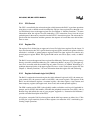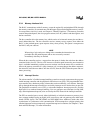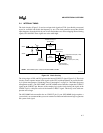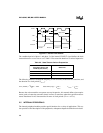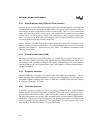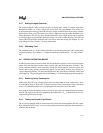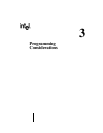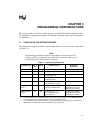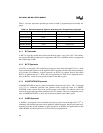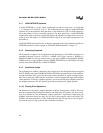
8XC196MC, MD, MH USER’S MANUAL
2-12
2.6.3 Programming the Nonvolatile Memory
MCS 96 microcontrollers that have internal OTPROM provide several programming options:
• Slave programming allows a master EPROM programmer to program and verify one or
more slave MCS 96 microcontrollers. Programming vendors and Intel distributors typically
use this mode to program a large number of microcontrollers with a customer’s code and
data.
• Auto programming allows an MCS 96 microcontroller to program itself with code and data
located in an external memory device. Customers typically use this low-cost method to
program a small number of microcontrollers after development and testing are complete.
• Run-time programming allows you to program individual nonvolatile memory locations
during normal code execution, under complete software control. Customers typically use
this mode to download a small amount of information to the microcontroller after the rest of
the array has been programmed. For example, you might use run-time programming to
download a unique identification number to a security device.
• ROM dump mode allows you to dump the contents of the microcontroller’s nonvolatile
memory to a tester or to a memory device (such as flash memory or RAM).
Chapter 16, “Programming the Nonvolatile Memory,” provides recommended circuits, the corre-
sponding memory maps, and flow diagrams. It also provides procedures for auto programming.



